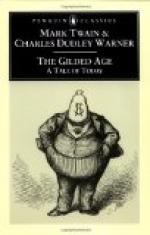So you observe, that you take your view from the back of the capitol. And yet not from the airy outlooks of the dome, by the way, because to get there you must pass through the great rotunda: and to do that, you would have to see the marvelous Historical Paintings that hang there, and the bas-reliefs—and what have you done that you should suffer thus? And besides, you might have to pass through the old part of the building, and you could not help seeing Mr. Lincoln, as petrified by a young lady artist for $10,000—and you might take his marble emancipation proclamation, which he holds out in his hand and contemplates, for a folded napkin; and you might conceive from his expression and his attitude, that he is finding fault with the washing. Which is not the case. Nobody knows what is the matter with him; but everybody feels for him. Well, you ought not to go into the dome anyhow, because it would be utterly impossible to go up there without seeing the frescoes in it—and why should you be interested in the delirium tremens of art?
The capitol is a very noble and a very beautiful building, both within and without, but you need not examine it now. Still, if you greatly prefer going into the dome, go. Now your general glance gives you picturesque stretches of gleaming water, on your left, with a sail here and there and a lunatic asylum on shore; over beyond the water, on a distant elevation, you see a squat yellow temple which your eye dwells upon lovingly through a blur of unmanly moisture, for it recalls your lost boyhood and the Parthenons done in molasses candy which made it blest and beautiful. Still in the distance, but on this side of the water and close to its edge, the Monument to the Father of his Country towers out of the mud—sacred soil is the, customary term. It has the aspect of a factory chimney with the top broken off. The skeleton of a decaying scaffolding lingers about its summit, and tradition says that the spirit of Washington often comes down and sits on those rafters to enjoy this tribute of respect which the nation has reared as the symbol of its unappeasable gratitude. The Monument is to be finished, some day, and at that time our Washington will have risen still higher in the nation’s veneration, and will be known as the Great-Great-Grandfather of his Country. The memorial Chimney stands in a quiet pastoral locality that is full of reposeful expression. With a glass you can see the cow-sheds about its base, and the contented sheep nimbling pebbles in the desert solitudes that surround it, and the tired pigs dozing in the holy calm of its protecting shadow.
Now you wrench your gaze loose, and you look down in front of you and see the broad Pennsylvania Avenue stretching straight ahead for a mile or more till it brings up against the iron fence in front of a pillared granite pile, the Treasury building-an edifice that would command respect in any capital. The stores and hotels that wall in this broad avenue are mean, and cheap, and dingy, and are better left without comment. Beyond the Treasury is a fine large white barn, with wide unhandsome grounds about it. The President lives there. It is ugly enough outside, but that is nothing to what it is inside. Dreariness, flimsiness, bad taste reduced to mathematical completeness is what the inside offers to the eye, if it remains yet what it always has been.




